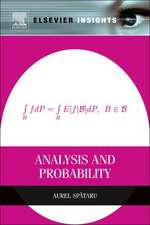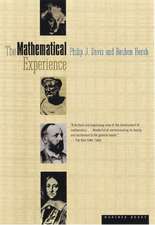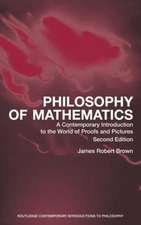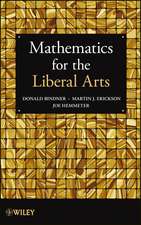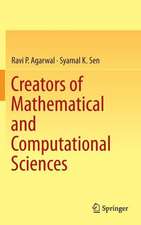Harmonies of Disorder: Norbert Wiener: A Mathematician-Philosopher of Our Time: Springer Biographies
Autor Leone Montagninien Limba Engleză Hardback – sep 2017
| Toate formatele și edițiile | Preț | Express |
|---|---|---|
| Paperback (1) | 426.35 lei 38-44 zile | |
| Springer International Publishing – 4 aug 2018 | 426.35 lei 38-44 zile | |
| Hardback (1) | 591.79 lei 6-8 săpt. | |
| Springer International Publishing – sep 2017 | 591.79 lei 6-8 săpt. |
Din seria Springer Biographies
-
 Preț: 208.26 lei
Preț: 208.26 lei -
 Preț: 315.67 lei
Preț: 315.67 lei -
 Preț: 219.51 lei
Preț: 219.51 lei - 5%
 Preț: 839.87 lei
Preț: 839.87 lei -
 Preț: 336.04 lei
Preț: 336.04 lei -
 Preț: 318.44 lei
Preț: 318.44 lei -
 Preț: 193.31 lei
Preț: 193.31 lei -
 Preț: 274.48 lei
Preț: 274.48 lei -
 Preț: 204.53 lei
Preț: 204.53 lei -
 Preț: 214.42 lei
Preț: 214.42 lei -
 Preț: 268.09 lei
Preț: 268.09 lei - 5%
 Preț: 170.93 lei
Preț: 170.93 lei - 5%
 Preț: 801.29 lei
Preț: 801.29 lei - 5%
 Preț: 559.48 lei
Preț: 559.48 lei - 5%
 Preț: 276.15 lei
Preț: 276.15 lei -
 Preț: 287.24 lei
Preț: 287.24 lei -
 Preț: 258.38 lei
Preț: 258.38 lei -
 Preț: 320.20 lei
Preț: 320.20 lei -
 Preț: 321.79 lei
Preț: 321.79 lei -
 Preț: 220.13 lei
Preț: 220.13 lei -
 Preț: 289.21 lei
Preț: 289.21 lei - 15%
 Preț: 649.87 lei
Preț: 649.87 lei -
 Preț: 257.08 lei
Preț: 257.08 lei -
 Preț: 268.91 lei
Preț: 268.91 lei -
 Preț: 324.27 lei
Preț: 324.27 lei -
 Preț: 257.95 lei
Preț: 257.95 lei - 5%
 Preț: 310.87 lei
Preț: 310.87 lei - 5%
 Preț: 1031.00 lei
Preț: 1031.00 lei - 15%
 Preț: 527.79 lei
Preț: 527.79 lei - 15%
 Preț: 603.39 lei
Preț: 603.39 lei -
 Preț: 392.67 lei
Preț: 392.67 lei -
 Preț: 244.91 lei
Preț: 244.91 lei - 15%
 Preț: 650.69 lei
Preț: 650.69 lei -
 Preț: 369.79 lei
Preț: 369.79 lei -
 Preț: 388.90 lei
Preț: 388.90 lei - 5%
 Preț: 723.78 lei
Preț: 723.78 lei
Preț: 591.79 lei
Preț vechi: 696.22 lei
-15% Nou
Puncte Express: 888
Preț estimativ în valută:
113.24€ • 118.23$ • 93.72£
113.24€ • 118.23$ • 93.72£
Carte tipărită la comandă
Livrare economică 05-19 aprilie
Preluare comenzi: 021 569.72.76
Specificații
ISBN-13: 9783319506562
ISBN-10: 3319506560
Pagini: 299
Ilustrații: XX, 307 p. 1 illus.
Dimensiuni: 155 x 235 mm
Greutate: 0.64 kg
Ediția:1st ed. 2017
Editura: Springer International Publishing
Colecția Springer
Seria Springer Biographies
Locul publicării:Cham, Switzerland
ISBN-10: 3319506560
Pagini: 299
Ilustrații: XX, 307 p. 1 illus.
Dimensiuni: 155 x 235 mm
Greutate: 0.64 kg
Ediția:1st ed. 2017
Editura: Springer International Publishing
Colecția Springer
Seria Springer Biographies
Locul publicării:Cham, Switzerland
Cuprins
Introduction.- PART I 1894-1918.- Chapter 1 – Roots.- Chapter 2 – Education.- Chapter 3 - A young Philosopher.- PART II 1919-1939.- Chapter 4 - A Mathematician at work.- Chapter 5 - Reflections on Science and Technology.- PART III. 1940-1945.- Chapter 6 - Military Research Projects.- PART IV - 1946-1964.- Chapter 7 - After Hiroshima and Nagasaki.- Chapter 8 - The book Cybernetics.- Ch. 9 - After Cybernetics.- Conclusions.- References.- Index of names.- Subject index.
Recenzii
“This masterful scholarly work connects Wiener to the important thinkers who influenced him, and illuminates the many contributions Wiener made to the fields of mathematics, engineering, computer science, and philosophy. Summing Up: Recommended. Upper-division undergraduates through faculty and professionals.” (R. L. Pour, Choice, Vol. 55 (9), May, 2018)
“Norbert Wiener was one of the great geniuses of the 20th century. Harmonies of disorder is a brilliant biography that carefully details every aspect of Wiener’s background and contributions without using any equations, making it accessible to general readers with an interest in science and its history … . The reader is privileged to see the thinking of a great genius and how significant developments of the 20th century came about. Every comprehensive library should have this book.” (Computing Reviews, January, 2018)
“The whole book is very readable and gives important insightsinto the intellectual development of an outstanding thinker. Many links are discussed with respect to philosophy, social sciences, and physics and many well-known characters of the computer age like von Neumann and Wiener’s contacts with them are discussed. The book comprises an important step in understanding Wiener’s thinking.” (Thomas Sonar, zbMATH 1377.01002, 2018)
Notă biografică
Leone Montagnini has worked on the history and philosophy of science and technology for more than 20 years, during which time he has devoted much attention to cybernetics and the thought and work of Norbert Wiener. He holds a PhD in Computational and Computer Sciences, an MA in Philosophy, an MA in Sociology, and a degree in Nuclear Engineering. Dr. Montagnini has lectured across the world, including at Tsinghua University in Beijing, the Universities of Vienna, Budapest, and Helsinki, and the Scuola Normale Superiore in Pisa. He has published many journal articles and book chapters on his chosen topics.
Textul de pe ultima copertă
This book presents the entire body of thought of Norbert Wiener (1894–1964), knowledge of which is essential if one wishes to understand and correctly interpret the age in which we live. The focus is in particular on the philosophical and sociological aspects of Wiener’s thought, but these aspects are carefully framed within the context of his scientific journey. Important biographical events, including some that were previously unknown, are also highlighted, but while the book has a biographical structure, it is not only a biography. The book is divided into four chronological sections, the first two of which explore Wiener’s development as a philosopher and logician and his brilliant interwar career as a mathematician, supported by his philosophical background. The third section considers his research during World War II, which drew upon his previous scientific work and reflections and led to the birth of cybernetics. Finally, the radical post-war shift in Wiener’s intellectual pathis considered, examining how he came to abandon computer science projects and commenced ceaseless public reflections on the new sciences and technologies of information, their social effects, and the need for responsibility in science.
Caracteristici
Explores the philosophical and sociological aspects of Wiener’s thought Frames these aspects within the context of Wiener’s scientific journey Clarifies Wiener’s role in developing new scientific concepts and theories and their relation to World War II projects Examines Wiener’s prophetic contributions to the information society as a cybernetics age Includes supplementary material: sn.pub/extras

